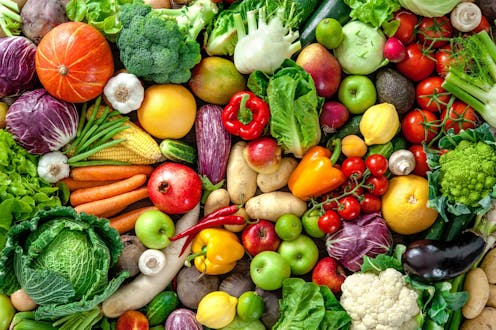The global food system is owned by an ever smaller number of companies – it’s damaging our health, our communities and the planet
- Written by Liam Keenan, Assistant Professor in Economic Geography, University of Nottingham

Across the world, over 800 million people[1] spend their days hungry. More than 2 billion[2] have limited access to food. Yet today’s global food system produces enough[3] to feed every person on the planet.
This imbalanced situation can be explained in part by the effects of things like natural disasters, war, fragile supply chains and economic inequality. These are all significant factors which highlight the problems of a truly global food system, where shocks spread quickly from one place to another with sometimes devastating results.
But they do not provide the full picture and cannot fully explain the rise of ultra-processed foods[4], the financial difficulties facing farmers[5], or why the world has failed to address the harmful environmental impacts[6] of food production.
To account for these trends, we need to look at market concentration[7], and how a small number of very big companies have come to dominate the production and supply of the food we all eat.
For the global food system[8] has become much more concentrated[9] in recent years, partly through an increase in mergers and acquisitions, where large firms buy up rival companies until they completely dominate key areas.
High levels of market concentration[10] mean less transparency, weaker competition, and more power in the hands of fewer firms. And our research[11] reveals that a rise in the number of mergers and acquisitions is taking place at all stages of the global food system – from seeds and fertilisers to machinery and manufacturing.
This is all part of food being increasingly seen as a source not only of human sustenance, but as a profitable investment – or what is known as the “financialisation of food”[12].
And while people have been buying and selling food for a very long time, the global system has seen a major incursion[13] of big finance in recent decades. Pension funds, private equity and asset management firms have invested heavily in the sector.
The logic is simple. Everybody needs food, so the sector promises safe and potentially lucrative returns.
But feeding the world while looking after the planet costs money, and unfortunately, big financial actors are all about the bottom line. They aim to maximise returns, provide value to shareholders, and meet the expectations of markets.
This makes mergers and acquisitions an attractive business proposition[14]. Why make risky, long-term investments in sustainable food solutions, when you can buy your competitor, increase your market share, and potentially make a lot of money in the process? By boosting share prices and removing competition, buy-outs have been used widely[15] throughout the global food system as an easier way to achieve further growth.
This has resulted in more concentration and fewer, more powerful firms. One report[16] revealed that just four firms control 44% of the global farm machinery market, two companies control 40% of the global seed market, and four businesses control 62% of the global agrochemicals market. This trend is matched in food retail, with four firms – Tesco, Sainsbury’s, Asda, and Morrisons – estimated to control over 64%[17] of the UK grocery market.
This level of concentration and power affects everyone. It means less bargaining power for farmers[18], who are forced to negotiate with powerful conglomerates. Workers across key stages of the global food sector face downward pressures on wages, rights[19], and conditions. Local communities lose autonomy[20] over how their land is cultivated and how the rewards are distributed.
And the negative effects are not limited to those working in food.
Fewer firms and less transparency can lead to higher prices[22]. And research[23] on Europe has shown that places with higher food market concentration, including the UK and Germany, sell more ultra-processed food.
The global food system also plays a big part in climate change[24]. Too much corporate power limits the opportunities for communities to tackle environmental issues, and move towards sustainable provision of healthy food for everyone[25] by producing more food themselves.
With so much at stake, improved regulation should surely be on the menu. Our research[26] revealed the majority of food system mergers and acquisitions take place between firms of the same nationality. This could provide an opportunity for governments to prevent further market concentration within their borders – and even to seek to dilute what already exists.
International arrangements are more complicated, and would require a coordinated, international approach. However, this may prove difficult given the first-ever UN “food systems summit” in 2021 remained “strategically silent”[27] on the issue.
We believe market concentration must become a defining feature of food system reform. To address climate change, provide a fair deal for workers, and eradicate hunger, we need power to be less corporate – for the benefit of the entire global community.
References
- ^ 800 million people (www.who.int)
- ^ 2 billion (www.who.int)
- ^ produces enough (www.actionagainsthunger.org)
- ^ rise of ultra-processed foods (link.springer.com)
- ^ facing farmers (www.theguardian.com)
- ^ environmental impacts (www.un.org)
- ^ market concentration (www.bloomsbury.com)
- ^ global food system (www.sciencedirect.com)
- ^ more concentrated (www.tni.org)
- ^ market concentration (www.nature.com)
- ^ our research (www.sciencedirect.com)
- ^ “financialisation of food” (onlinelibrary.wiley.com)
- ^ major incursion (www.foei.org)
- ^ attractive business proposition (www.foei.org)
- ^ used widely (www.sciencedirect.com)
- ^ report (www.etcgroup.org)
- ^ over 64% (www.kantarworldpanel.com)
- ^ bargaining power for farmers (www.openmarketsinstitute.org)
- ^ rights (www.jstor.org)
- ^ lose autonomy (www.jstor.org)
- ^ Billion Photos/Shutterstock (www.shutterstock.com)
- ^ higher prices (www.theguardian.com)
- ^ research (www.ncbi.nlm.nih.gov)
- ^ plays a big part in climate change (www.un.org)
- ^ healthy food for everyone (www.sciencedirect.com)
- ^ Our research (www.sciencedirect.com)
- ^ “strategically silent” (link.springer.com)







